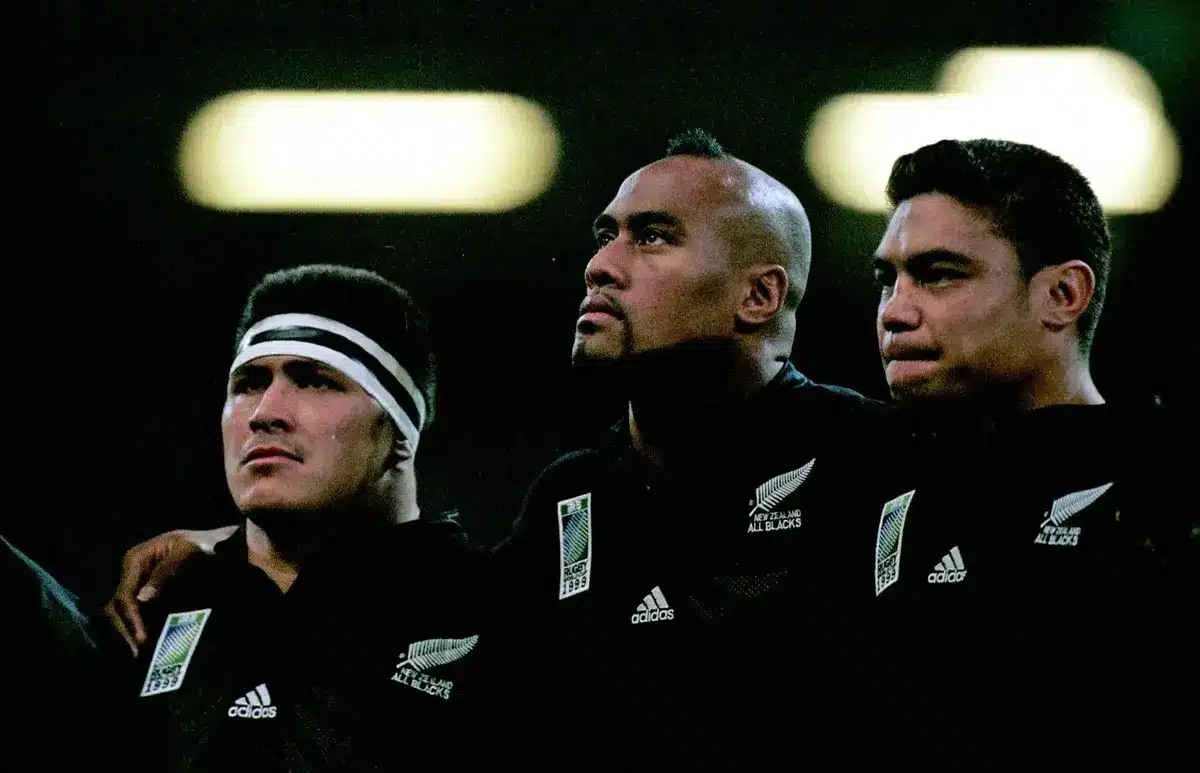The son of late All Blacks icon Jonah Lomu has made a shock revelation – if he follows his famous father into rugby, it’s France he wants to represent.
Dhyreille Jonah Lomu, a winger like his dad, was born in France during Jonah’s brief stint with Marseille, meaning international eligibility wouldn’t be an issue.
Nicknamed ‘Frenchie’ at school in New Zealand, Dhyreille is already turning heads at age-grade tournaments and is showing early signs of serious talent.
Jonah’s time in France came towards the end of his glittering career, which also included a spell at Cardiff Blues. Tragically, the global rugby superstar passed away in 2015.
Jonah finished with 63 caps and 37 tries for New Zealand – and is still widely regarded as the game’s first global megastar.
But while Jonah lit up the rugby field, his teenage sons Brayley and Dhyreille are carving their own path – with a tennis ball, not a rugby one.
Their dream of becoming professional athletes led to a switch four years ago from traditional schooling to Te Kura, New Zealand’s correspondence school, so they could maximise their training time.
“Professional sport is hard, but playing tennis is our life. I love all kinds of exercise, and doing online school means we can fit in a lot more training,” says Dhyreille, who strongly resembles his famous dad.
“Depending on when we can get court time, I can be playing tennis from 9am until about 7.30pm.
“My dream is to become a number one professional tennis player in the world,
“Dad will always be the best and I thought to maybe give something else a try cause I’ll never be better than him,”
Their mum Nadene, and grandfather Mervyn, play a huge role in their development – with Mervyn often coaching and shuttling the boys across Auckland for court time.
“The love within our family is pretty special,” says Nadene. “Dad and the boys cruise and gym together. I’m very grateful to have parents who love me.”
The brothers are humble and well-mannered – quick to help, respectful, and focused. Brayley is the quieter of the two, but admits:
“Dhyreille is the most competitive by far!”
“Goodbye, caterpillar ruck” – Five more rugby law changes for 2026
In this piece, we spotlight four specific laws that deserve reconsideration—proposed not out of criticism, but from a deep respect for the game and a passion to see it continue to thrive for players and fans alike.
World Rugby has shown a readiness to adapt in recent years—these ideas could mark the next step in that ongoing evolution.
Join RUCK’s Instagram broadcast channel and get the latest rugby news straight to your phone.
1. No more draws
Rugby is one of the most thrilling sports in the world, but draws often leave players and fans frustrated. After 80 minutes of hard-fought action, neither team winning can feel unsatisfying and anticlimactic. Introducing golden point—where the first score in extra time wins—would give matches a clear, decisive ending.
Golden point also encourages attacking rugby. Teams would be pushed to take risks, go for tries, or attempt drop goals rather than playing safe for a draw. Every possession would matter even more, and fans would be treated to the kind of high-stakes drama that other sports, like rugby league and AFL, have long enjoyed.
It would make competitions simpler and fairer too. League tables, knockout tournaments, and international fixtures often rely on tiebreakers to separate teams after draws. Golden point ensures there’s always a winner on the scoreboard, rewarding performance rather than chance or points difference.
Player welfare concerns can be managed by limiting extra time to short bursts—say two five-minute halves or a first-score-wins rule within 10 minutes—keeping the game exciting without overtaxing athletes.
Golden point wouldn’t just make rugby more exciting—it would make it fairer, more competitive, and in tune with the modern expectation that every game should have a winner. With more tight contests in both club and international rugby, there’s never been a better time to adopt it.
2. Fewer Substitutions
Rugby has changed significantly over the years, and one of the biggest shifts is how the bench is used. These days, teams often bring on almost an entirely new forward pack late in the game. Big, fresh players crash into tired defenders, making the final 20 minutes less about skill and endurance, and more about brute force. Many fans and former players feel this has turned rugby into a collision sport rather than a contest of stamina and intelligence.
Reducing the number of substitutions would encourage players to pace themselves. Space would open up in the second half, creating more opportunities for creative play rather than endless phases of pick-and-go. It would reward fitness, smart decision-making, and those capable of performing for the full 80 minutes.
Fewer substitutions wouldn’t just make the game more exciting—it would make it fairer, safer, and more in line with the spirit of what rugby has always been about.
With the rise of 6–2 and even 7–1 bench splits, pioneered by Rassie Erasmus, the trend seems to be heading in the opposite direction. That’s all the more reason to act now.
Like this:
Like Loading…

